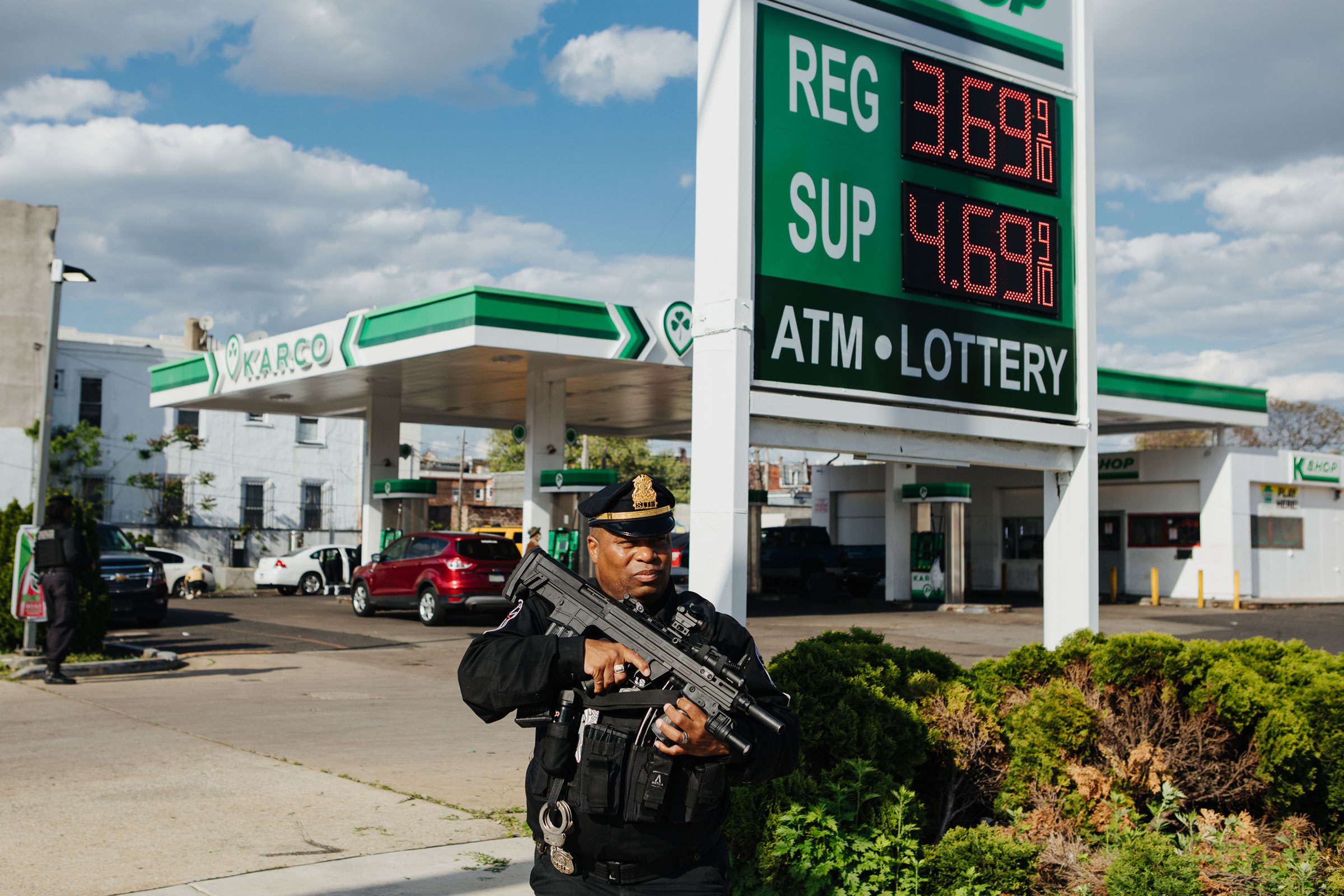This story is one of three in Insecure, a series about the private security industry. Read part 2: In the World of Private Security, There Aren’t Many Rules or Regulations. And part 3: The Problems Inside North America’s Largest Security Firm—and Third-Biggest Employer.
Andre Boyer enters the gas station like a soldier—back straight, boots shined, AR-15 pointed towards the floor. He’s late to meet me, he says, because his employee caught a shoplifter and he needed to sort through red tape. He seems unaware of the flutter of anxiety spreading through the store as customers see his weapon, handcuffs, and bulletproof vest. But if anyone asked, which they don’t, he’d assure them that he’s there for their own good, even though it’s hard to be relaxed in the presence of a loaded gun.
“We’re not here to beat people up,” says Boyer, who heads S.I.T.E, a private protection agency that is patrolling gas stations and hotels in Philadelphia at the behest of store owners. “We’re here to let the public know that they can feel safe.”
Boyer’s armed guard service has boomed over the last year as Philadelphia police staffing issues led to longer response times. Neil Patel, the owner of this Karco gas station, says he hired Boyer in December after thieves stole an ATM from his gas station and the police didn’t respond for six hours.
Patel is not the only business owner shelling out money for private security as police departments across the U.S. lose staff. Already struggling to recruit new applicants in 2019, police departments saw a spike of retirements and a drop-off in new recruits after the 2020 murder of George Floyd and subsequent backlash against police, says Chuck Wexler, the executive director of the Police Executive Research Forum. In Philadelphia alone, police staffing levels dropped nearly 10% from the end of 2019 to the end of 2022, a recent government audit found. Nationally, the number of sworn officers dropped 7% between 2019 and 2021, according to FBI data.
More from TIME
While police departments were losing officers, crime was rising in many parts of America. Murders, assaults, and car thefts rose nationally in 2020, according to the Brennan Center for Justice, and an increase in homelessness has heightened anxieties about safety. These factors bolstered the private security industry, which had already been growing steadily since the terrorist attacks of September 11 but has boomed since 2020. There are roughly twice as many security guards employed in the U.S. than there were 20 years ago, according to the Security Industry Association, though the nation’s population has only grown 16% over the same time period. By 2021, there were about 2 police officers but 3.1 security guards for every 1,000 civilians.
“Private security is going to take over everything,” says Boyer, the Philadelphia armed guard. He adds that a father recently hired him to take his two children to the movies, armed with a shotgun, to make sure they were safe.
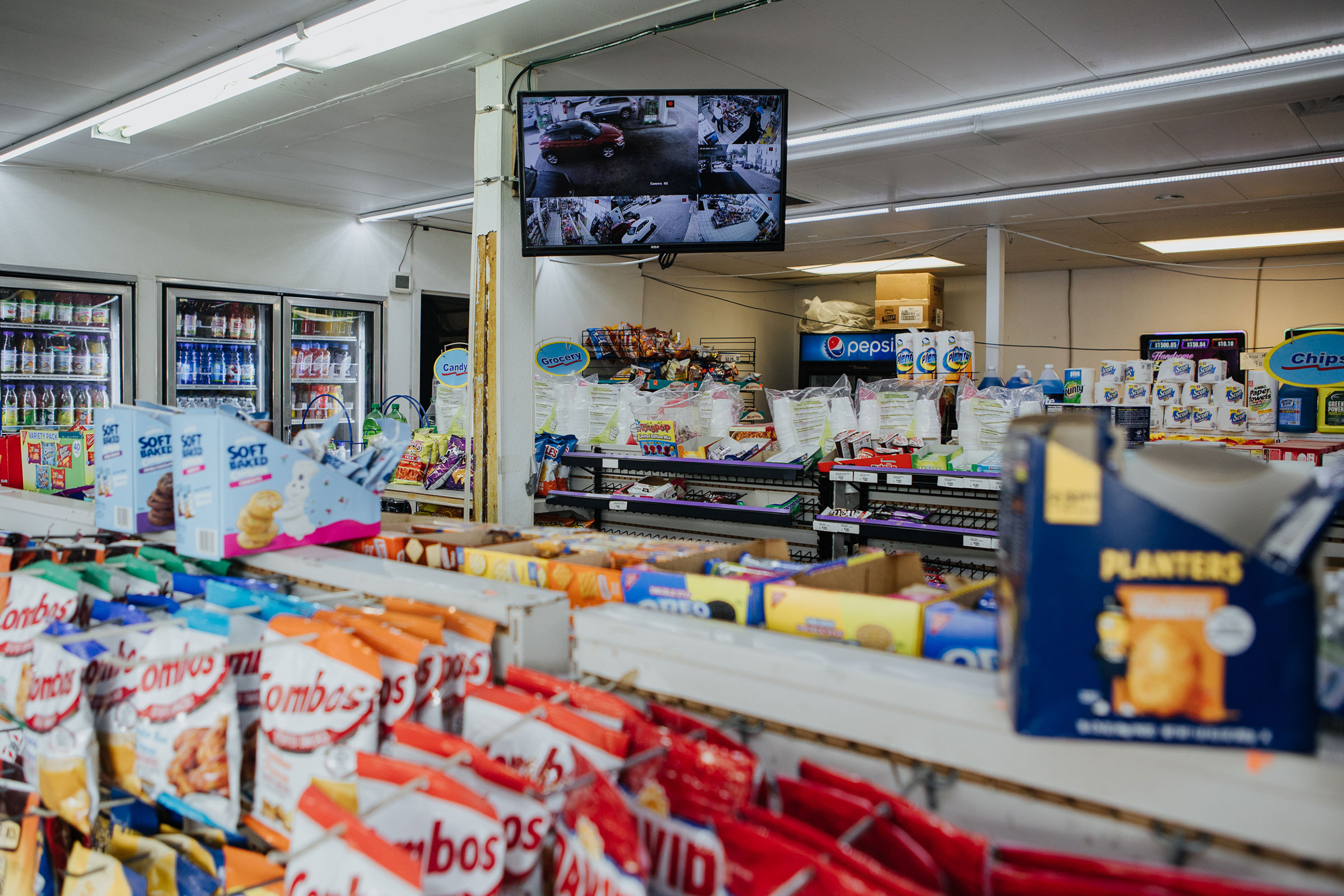
Private security signals an unequal economy
The rise of private security is both driven by income inequality—wealthy people have more things to protect and money to spend to protect them—and exacerbates it. For every Neil Patel who decides to shell out $750 a day for round-the-clock armed guards, there are thousands of business owners and civilians who have to make do with what their taxes can buy. The Los Angeles Police Department is not meeting its staffing goals, for instance, but its neighbor, tony Beverly Hills, Calif., has hired two security firms whose employees patrol the city in cars or on foot as “an extension of the police,” says Todd Johnson, CEO of the Beverly Hills Chamber of Commerce.
“In the last two years, with everything we have gone through, we want to make sure that the luxury capital of the world is also one of the safest places,” Johnson says.
Residents and business associations in upper-middle class neighborhoods like Lincoln Park, Chicago, Neponsit, N.Y. and San Francisco’s Marina District have chipped in extra money to hire private security because residents report feeling unsafe. By contrast, in New Orleans, a city where the median income is about half that in Beverly Hills, police response times have tripled, from 51 minutes in 2019 to 146 minutes last year.
Wealthy cities can also attract more police officers because they have the tax base to offer high wages and benefits. Seattle, for instance, is offering an $80,000 salary and $30,000 signing bonus. But poorer police departments can’t come close to matching that kind of money, says Wexler, with the Police Executive Research Forum. “This is what keeps police chiefs and mayors up at night—who are going to be the future police officers in their city,” he says.
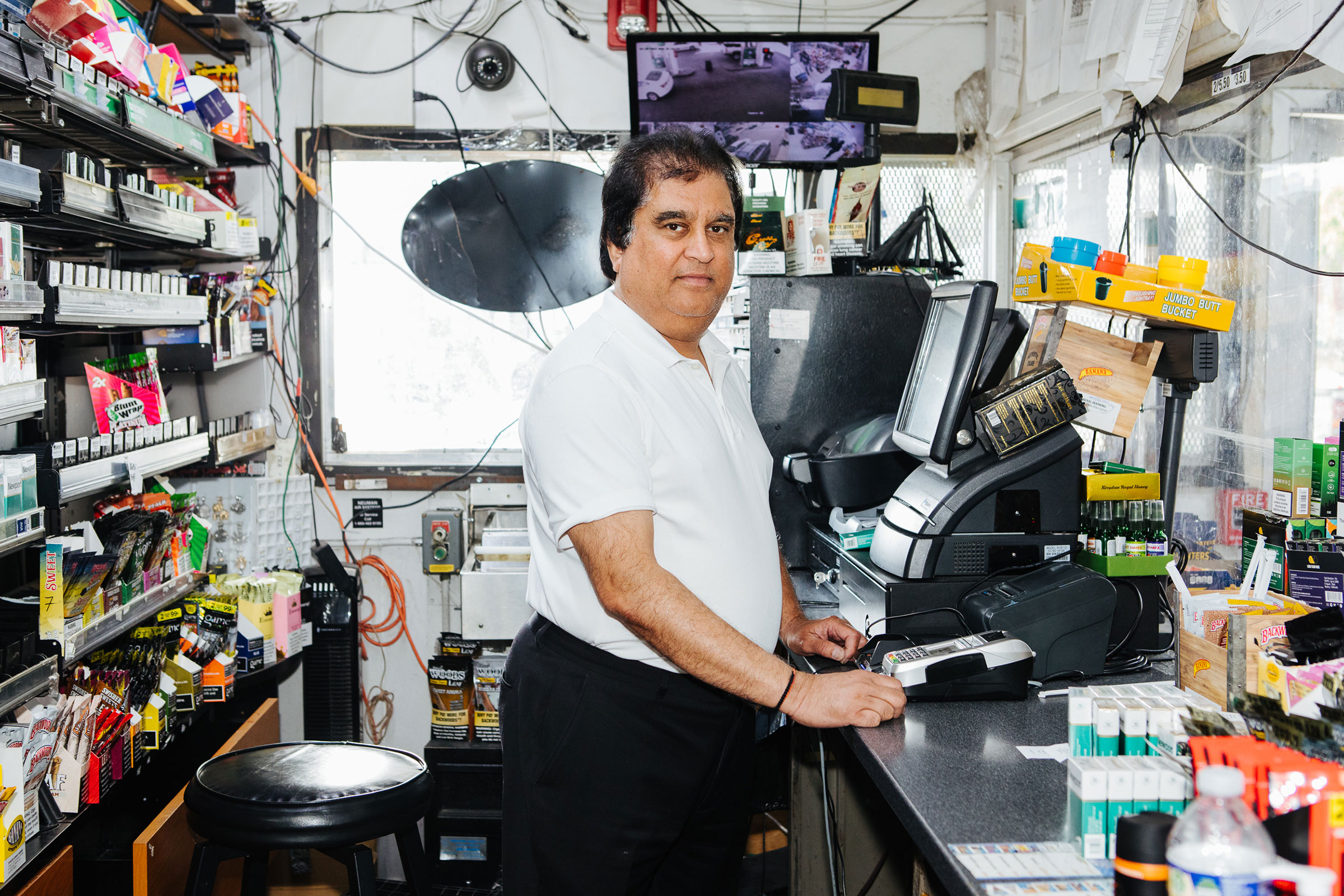
This have and have-not of protection is one sign of an unequal economy. Sociologists use the term “guard labor economy” to describe a situation where a growing number of people are employed in jobs where they exercise control over people and protect private property. As inequality rises and there is more media coverage of crime, companies allocate more labor to protecting their property, says Luke Petach, a professor of economics at Belmont University, whose research has found that places with higher shares of people employed in guard labor are correlated with more inequality and racial animosity.
Deborah Avant, a professor at the University of Denver who studies the security industry globally, says that inequality leads us to “think of security in narrower and narrower ways—protecting our stuff rather than generating communities where we are all safe.”
A mile or so south of where Boyer and his company are patrolling the gas station, William Miller steers a decommissioned police car etched with JNS Protection Services around the “green zone,” a 10 block area bordering the campus of Temple University. Jennifer Hedberg, the mom of a Temple University student, hired JNS Protection Services to patrol the streets in 2021 after another student at the college was shot and killed in an apparent carjacking. (Like many city police departments, the Temple University police have had trouble recruiting, and now have about 40% fewer officers on patrol than a decade ago, says Alec Shaffer, the president of the Temple University Police Association. Temple did not return multiple requests for comment.)
Hedberg says she “set up our own perimeter,” having JNS patrol the blocks on which her son and his girlfriend lived, and then asking for donations from parents of other students living there. She admits that JNS security can’t really do anything if they see a crime in progress except call the police, and that the workers are “not as vetted” as the police, but she says the patrols give parents and kids peace of mind knowing someone is there.
As he drives around, Miller, a former fitness trainer, takes pictures at intersections and dictates what he is seeing into his phone. But only some parents can access these reports. That’s because Stacy Fritz, the mom who took over organizing the patrols after Hedberg’s son graduated, made a private Facebook group to share the reports and only admits parents who donate—because, she says, she wasn’t raising enough money to keep the patrols funded when any parent could access the reports. The cost of having a security guard patrol six hours a day, six hours a week, adds up to about $17,000 per semester, or around $1,000 a week.
The parents who organize the patrols are the ones who get to determine the rules. “It breaks my heart when people say, ‘My son isn’t in the zone, can you extend it?’” says Fritz. “But then they just get too big and you don’t feel as safe.”
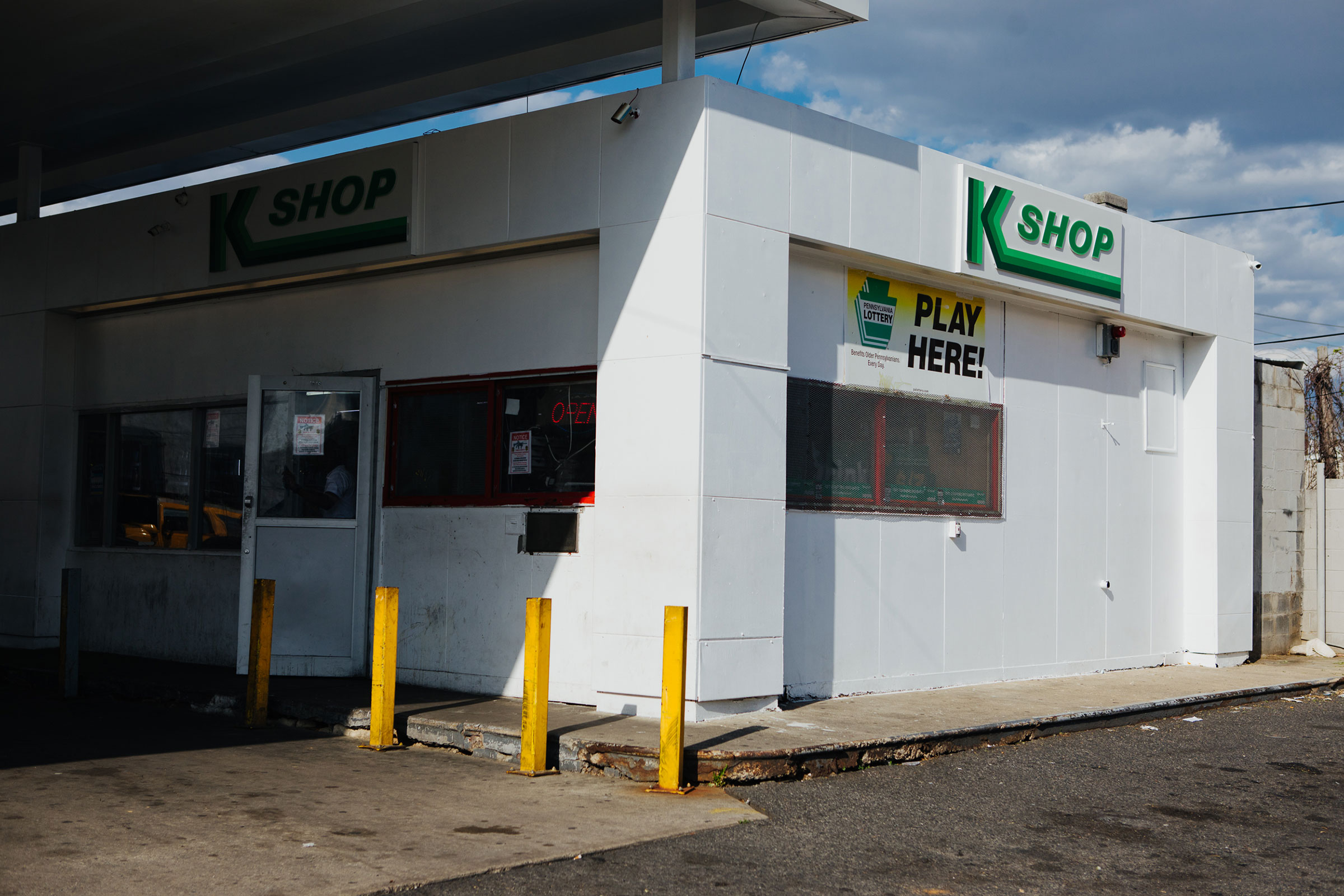
Security guards don’t always make communities safer
Ostensibly security guards are hired to make people feel safer. But, understandably, some civilians feel uneasy around the increased presence of guns and guards who are largely unregulated. Because the laws regulating private security vary from state to state, there’s a gray area where neither guards, their employers, nor the public seem to know exactly what a private security officer can and can’t do on the job.
Though many security companies will say that their employees act only as a deterrent and should call the police if they see a crime occurring, others appear to have a different take. Boyer, the Philadelphia guard, says that if someone steals something from the gas station where he works, the law allows him to “go after that person” to retrieve the property; he is currently getting eight Rottweilers trained to help him reclaim stolen property.
(A spokesman from the Pennsylvania State Police disagreed that Boyer could act like a police officer at the gas station, though the law in Pennsylvania does allow private citizens a good amount of leeway, says Rick McCann, the founder and CEO of Private Officer International, an association for security and law enforcement professionals. Pennsylvania and about 30 other states allow people to get trained as private police officers, which gives them full arrest authority on the private properties where they’re employed, McCann says.)
And some security guards, including Boyer, have contentious relationships with the police, which complicates questions of authority. Boyer worked for the Philadelphia Police Department from 1997 until 2013, when he was terminated, he says, for blowing the whistle on police misconduct. (The Philadelphia Police Dept. did not return multiple requests for comment.)
In 2021, Boyer was guarding a hotel when, according to a complaint he filed in U.S. District Court, two women acting “belligerent” assaulted him and spit in his face. He tasered one and then handcuffed her and called the police, but when the police arrived, they arrested Boyer, detaining him for 16 hours until the district attorney decided not to press charges. He is suing the police for wrongful arrest and says he was fully within his rights to defend himself. “If it comes to that, I will take a life,” he says.
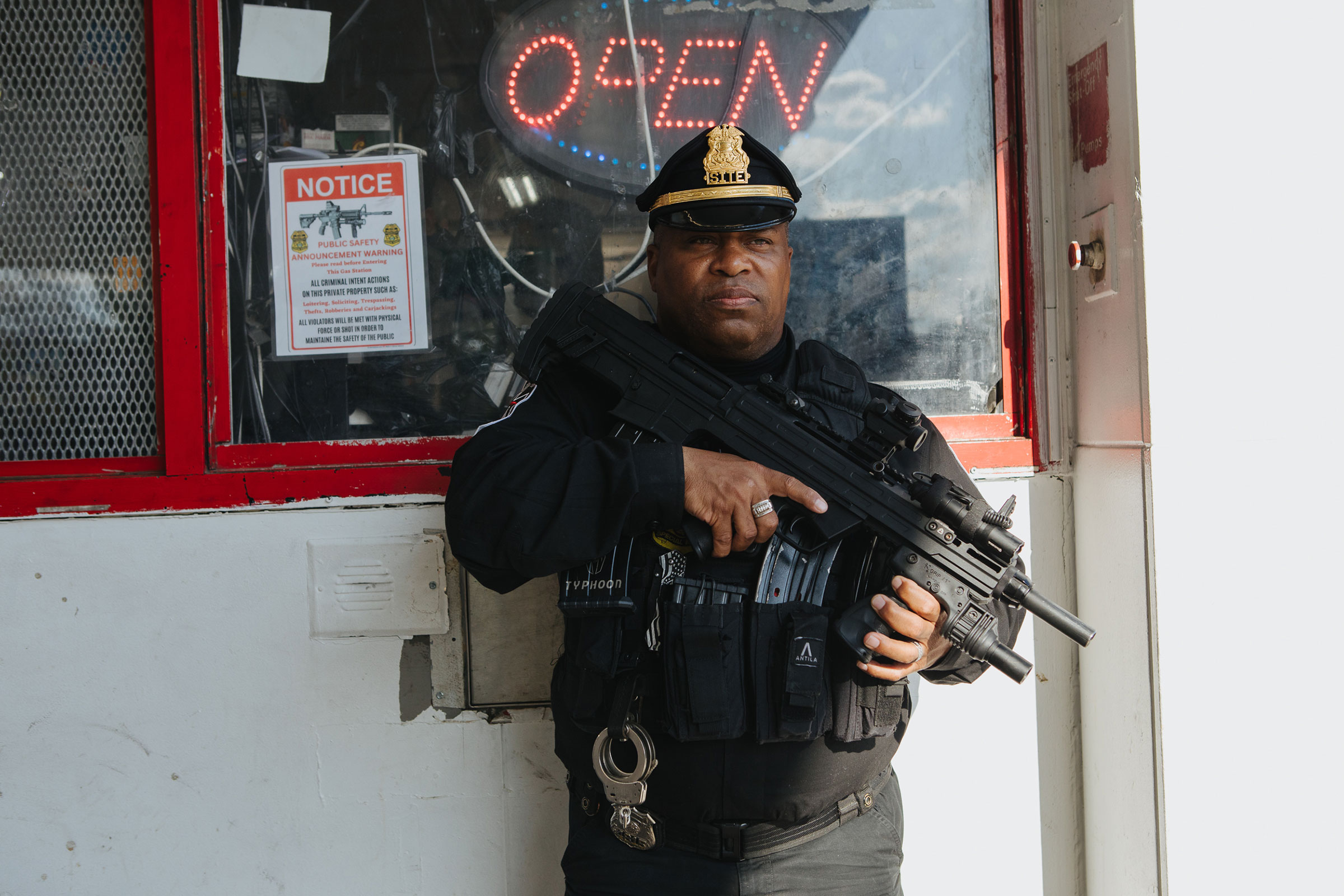
The presence of armed security guards in public settings does not even appear to be reducing violence—or crime. Walgreens said in an earnings call in January, for instance, that it was reverting to putting law enforcement in its stores rather than security officers because “the security companies are proven to be largely ineffective.”
On the campus of Temple University, where parents paid for private security patrols and where the university also hired a private security firm to supplement campus police, a campus officer was shot and killed in February, an off-campus home was firebombed in November, and Temple students in three separate off-campus homes were the victims of armed home invasions in November 2022. Temple University president Jason Wingard resigned in late March amid growing concerns about safety.
“You can increase policing, or security. But safety is a double edged sword,” says Veronica Rin, a Temple freshman who is thinking of transferring because of the violence around campus. “It’s not just about presence. It’s also how people feel.”
Read more: The Problems Inside North America’s Largest Security Firm—and Third-Biggest Employer
In February, Rin was walking by a campus building that holds a public food court when she and a friend saw a group of teenagers punching and kicking an older man on the street. A security guard employed by Allied Universal was posted on the corner, near where the fight was happening, but he didn’t intervene—Temple later said that the guard did what he was supposed to do and called the police. Rin stepped in and broke up the fight. Students captured her actions on camera and local news labeled her a hero, but the incident made her feel even more uneasy because she knows just how little private security will do.
“I would love to have someone who was like John Wick who made sure I was safe all the time,” she says, “but I’m just a college kid in America.”
I recently visited the spot where Rin broke up the fight; I was talking to the Allied Universal guard posted there when a call came over his radio that there was a fight happening inside the food court. By the time we got inside, the fight was over; two women had been screaming and throwing chairs at each other, a student told me, but workers from Panda Express had deescalated the situation.
I wondered if that food court fight would have gone differently had Andre Boyer been there with his AR-15 and then I was immediately glad that he wasn’t. I imagined a gun and a crowded dining hall and the terrible things that could have happened next.
It’s true that Neil Patel, the gas station owner, says he hasn’t had to report one criminal incident since Boyer’s firm started patrolling his lot. Before then, he says, his store was a constant blur of crime; people stealing and carjacking—one time, his car was vandalized while police were in the store, taking down a report about another crime. He’s sick of it all. I asked: couldn’t an armed guard have escalated those situations and led to someone being killed? “Too bad,” he said. “They deserve it.” Then he retreated behind the bulletproof glass shielding his cash register.
Read more: In the World of Private Security, There Aren’t Many Rules or Regulations
More Must-Reads from TIME
- Cybersecurity Experts Are Sounding the Alarm on DOGE
- Meet the 2025 Women of the Year
- The Harsh Truth About Disability Inclusion
- Why Do More Young Adults Have Cancer?
- Colman Domingo Leads With Radical Love
- How to Get Better at Doing Things Alone
- Michelle Zauner Stares Down the Darkness
Contact us at letters@time.com
